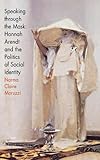Speaking through the Mask Hannah Arendt and the Politics of Social Identity / Norma Claire Moruzzi.
Material type: TextPublication details: Ithaca, N.Y. : Cornell University Press , (c)2000.; (Baltimore, Md. : Project MUSE, (c)2015).Description: 1 online resource (xiv, 205 pages )Content type:
TextPublication details: Ithaca, N.Y. : Cornell University Press , (c)2000.; (Baltimore, Md. : Project MUSE, (c)2015).Description: 1 online resource (xiv, 205 pages )Content type: - text
- computer
- online resource
- 9781501732003
- JC251 .S643 2001
- COPYRIGHT NOT covered - Click this link to request copyright permission: https://lib.ciu.edu/copyright-request-form
| Item type | Current library | Collection | Call number | URL | Status | Date due | Barcode | |
|---|---|---|---|---|---|---|---|---|
 Online Book (LOGIN USING YOUR MY CIU LOGIN AND PASSWORD)
Online Book (LOGIN USING YOUR MY CIU LOGIN AND PASSWORD)
|
G. Allen Fleece Library ONLINE | Non-fiction | JC251.74 (Browse shelf(Opens below)) | Link to resource | Available | on1132226872 |
Includes bibliographies and index.
Frontmatter -- Contents -- A Story -- Arendt Works Cited and Abbreviations Used -- One. The Human Condition as Embodied -- Two. The Social Question -- Three. The Mask and Masquerade -- Four. Speaking as Rahel: A Feminine Masquerade -- Five. Finding a Voice :The Author and the Other in The Origins of Totalitarianism -- Six. The Charlatan: Benjamin Disraeli -- Seven. Race and Economics -- Eight. The Banality of Evil -- Nine. Politics as Masquerade -- Notes -- Index
Hannah Arendt was famously resistant to both psychoanalysis and feminism. Nonetheless, psychoanalytic feminist theory can offer a new interpretive strategy for deconstructing her equally famous opposition between the social and the political.Supplementing critical readings of Arendt's most significant texts (including The Human Condition, On Revolution, Rahel Varnhagen, The Origins of Totalitarianism, Eichmann in Jerusalem, and The Life of the Mind) with the insights of contemporary psychoanalytic, feminist, and social theorists, Norma Claire Moruzzi reconstitutes the relationship in Arendt's texts between constructed social identity and political agency. Moruzzi uses Julia Kristeva's writings on abjection to clarify the textual dynamic in Arendt's work that constructs the social as a natural threat; Joan Riviere's and Mary Ann Doane's work on feminine masquerade amplify the theoretical possibilities implicit in Arendt's own discussion of the public, political mask. In a bold interdisciplinary synthesis, Moruzzi develops the social applications of a concept (the mask) Arendt had described as limited to the strictly political realm: a new conception of (political) agency as (social) masquerade, traced through the marginal but emblematic textual figures who themselves enact the politics of social identity.
COPYRIGHT NOT covered - Click this link to request copyright permission:
There are no comments on this title.
